Mark Carney, the Bank of England governor, said on Monday that he would serve an additional year as head of the central bank and step down in June 2019.
The decision dispels suggestions in the British press that Mr. Carney would step down in 2018, his original five-year time frame. Mr. Carney has been called upon to resign by some politicians who support an exit from the European Union, or Brexit. They argued that Mr. Carney politicized the bank ahead of the June 23 vote on whether to leave.
An early departure by Mr. Carney could have been unsettling for the markets. Concerns over the impact of Brexit have sent the British pound to its lowest level since the mid-1980s.
Mr. Carney will now most likely stay as head of the central bank through the final negotiations by Britain on its exit from the 28-nation bloc.
In a letter on Monday to Philip Hammond, the chancellor of the Exchequer, Mr. Carney noted the need for continuity while Britain negotiates its departure from the European Union.
“This should help contribute to securing an orderly transition to the U.K.’s new relationship with Europe,” Mr. Carney said in his letter.
On Monday, Prime Minister Theresa May expressed her support for the central bank chief, before meeting with him later in the day.
Ms. May has pledged to activate Article 50 — the two-year process under which Britain will formally leave the European Union — by the end of March.
Mark Carney leaves No. 10 Downing Street on Monday after a meeting. Photo:onlinenewsplanet.com
Mr. Carney, a 51-year-old Canadian, had been expected to update the public on his plans this year and told a committee in the House of Lords last week that he was reflecting on how long he would stay at the bank, calling it an “entirely personal decision.”
“I am very pleased to hear that you intend to continue as governor of the Bank of England,” Mr. Hammond said in a reply to Mr. Carney on Monday. “This will enable you to continue your highly effective leadership of the bank through a critical period for the British economy as we negotiate our exit from the European Union.”
The central bank is expected to unveil within days its latest monetary policy decision and provide an updated forecast for inflation.
The bank’s Monetary Policy Committee is widely expected to keep interest rates steady when it announces its decision on Thursday.
Mr. Carney was praised in the days after the referendum for acting as a steadying force after David Cameron stepped down as prime minister and there was a battle for leadership of the ruling Conservative Party.
In August, the central bank cut its benchmark interest rate to 0.25 percent, the lowest level in its 322-year history, and expanded other measures to bolster Britain’s economy over fears that Brexit could weigh on growth. The rate had remained steady at 0.5 percent since March 2009.
But the British economy has performed better than expected since the June referendum.
Last week, the Office of National Statistics said that gross domestic product grew at a 0.5 percent rate between July and September, ahead of forecasts by economists.
That has led some politicians who favored Brexit to renew their calls for Mr. Carney’s departure.
(NEW YORK TIMES)
 简体中文
简体中文





